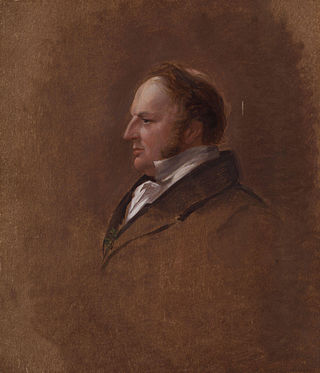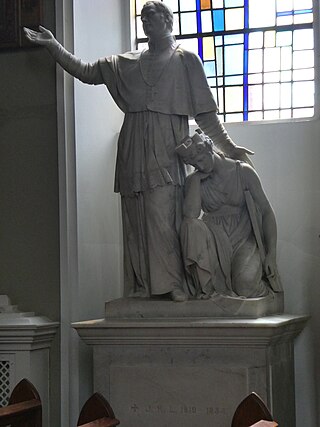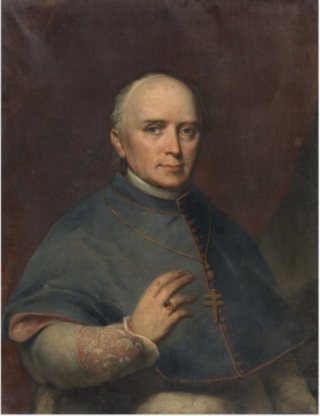Related Research Articles

Sir Charles Gavan Duffy, KCMG, PC, was an Irish poet and journalist, Young Irelander and tenant-rights activist. After emigrating to Australia in 1856 he entered the politics of Victoria on a platform of land reform, and in 1871–1872 served as the colony's 8th Premier.

St Patrick's Pontifical University, Maynooth, is a pontifical Catholic university in the town of Maynooth near Dublin, Ireland. The college and national seminary on its grounds are often referred to as Maynooth College.

William Smith O'Brien was an Irish nationalist Member of Parliament (MP) and a leader of the Young Ireland movement. He also encouraged the use of the Irish language. He was convicted of sedition for his part in the Young Irelander "Famine Rebellion" of 1848 but his sentence of death was commuted to deportation to Van Diemen's Land. In 1854, he was released on the condition of exile from Ireland, and he lived in Brussels for two years. In 1856 Smith O'Brien was pardoned and returned to Ireland, but he was never active again in politics.

Hugh Boyd M‘Neile was a well-connected and controversial Irish-born Calvinist Anglican of Scottish descent.
The Irish Church Missions (ICM) is a conservative and semi-autonomous Anglican mission. It was founded in 1849 as The Irish Church Missions to the Roman Catholics chiefly by English Anglicans though with the backing and support of Church of Ireland clergy and bishops, with the aim of converting the Roman Catholics of Ireland to Protestantism. The reference to Roman Catholics in the title was removed in 2001.

Sir Robert Harry Inglis, 2nd Baronet, FRS was an English Conservative politician, noted for his staunch high church views.

John MacHale was the Irish Roman Catholic Archbishop of Tuam, and Irish nationalist.

The history of Ireland from 1691–1800 was marked by the dominance of the Protestant Ascendancy. These were Anglo-Irish families of the Anglican Church of Ireland, whose English ancestors had settled Ireland in the wake of its conquest by England and colonisation in the Plantations of Ireland, and had taken control of most of the land. Many were absentee landlords based in England, but others lived full-time in Ireland and increasingly identified as Irish.. During this time, Ireland was nominally an autonomous Kingdom with its own Parliament; in actuality it was a client state controlled by the King of Great Britain and supervised by his cabinet in London. The great majority of its population, Roman Catholics, were excluded from power and land ownership under the penal laws. The second-largest group, the Presbyterians in Ulster, owned land and businesses but could not vote and had no political power. The period begins with the defeat of the Catholic Jacobites in the Williamite War in Ireland in 1691 and ends with the Acts of Union 1800, which formally annexed Ireland in a United Kingdom from 1 January 1801 and dissolved the Irish Parliament.
The Maynooth Grant was a cash grant from the British government to a Catholic seminary in Ireland. In 1845, the Conservative Prime Minister, Sir Robert Peel, sought to improve the relationship between Catholic Ireland and Protestant Britain by increasing the annual grant from the British government to St Patrick's College, Maynooth, a Catholic seminary in Ireland in dilapidated condition. It aroused a major political controversy in the 1840s, reflecting the anti-Irish and anti-Catholic feelings of many British Protestants.
William Maziere Brady (1825–1894) was an Irish priest, ecclesiastical historian and journalist who converted to Roman Catholicism from Anglicanism.

William Sharman Crawford (1780–1861) was an Irish landowner who, in the Parliament of the United Kingdom, championed a democratic franchise, a devolved legislature for Ireland, and the interests of the Irish tenant farmer. As a Radical representing first, with Daniel O'Connell's endorsement, Dundalk (1835-1837) and then, with the support of Chartists, the English constituency of Rochdale (1841–1852) he introduced bills to codify and extend in Ireland the Ulster tenant right. In his last electoral contest, standing on the platform of the all-Ireland Tenant Right League in 1852 he failed to unseat the Conservative and Orange party in Down, his native county.

Giovanni Giacinto Achilli was an Italian Roman Catholic Dominican friar and anti-Jesuit who was discharged from priesthood and imprisoned by the Roman Inquisition after being accused of child sexual abuse or for doctrinal heresy. However, Achilli escaped and subsequently became a fervent evangelist for the Protestant Anglican Communion. He is particularly notable for his activities in England and for launching a successful criminal prosecution against John Henry Newman, who made accusations about Achilli's past, for libel.
Sir Culling Eardley Eardley, 3rd Baronet was a British Christian campaigner for religious freedom and for the Protestant cause, one of the founders of the Evangelical Alliance.

James Warren Doyle, OESA (1786–1834) was a Roman Catholic Bishop of Kildare and Leighlin in Ireland, who used the signature "JKL", an acronym from "James Kildare and Leighlin." Doyle was active in the Anti-Tithe movement. A campaigner for Catholic Emancipation until it was attained in 1829, he was also an educator, church organiser and the builder of Carlow cathedral.
Algernon Sydney Thelwall was an evangelical Church of England clergyman and teacher of elocution.

Daniel Murray was a Roman Catholic Archbishop of Dublin.

Anti-Catholicism in the United Kingdom dates back to Roman times. Attacks on the Church from a Protestant angle mostly began with the English and Irish Reformations which were launched by King Henry VIII and the Scottish Reformation which was led by John Knox. Within England, the Act of Supremacy 1534 declared the English crown to be "the only supreme head on earth of the Church in England" in place of the Pope. Any act of allegiance to the latter was considered treasonous because the papacy claimed both spiritual and political power over its followers. Ireland was brought under direct English control starting in 1536 during the Tudor conquest of Ireland. The Scottish Reformation in 1560 abolished Catholic ecclesiastical structures and rendered Catholic practice illegal in Scotland. Today, anti-Catholicism remains common in the United Kingdom, with particular relevance in Scotland and Northern Ireland.
The Reformed Priests Protection Society was a charity founded in 1844 to support former Roman Catholic priests who converted to the Church of Ireland. It was also known as the Priests' Protection Society for Ireland or the Reformed Romanist Priests' Protection Society. The Society had four objects:
- to "protect Priests of good character, who conscientiously abandon the Church of Rome for the pure faith of the Gospel" and to find positions for them in parishes or as missionaries
- to "afford protection and education" to men who abandon studying for the Roman Catholic priesthood "in consequence of the influence of divine truth"
- to promote "Scriptural and anti-popish instruction" through sermons and pamphlets
- to "reform Romish Priests" worldwide

The Maynooth College Act 1845 was an Act of the Parliament of the United Kingdom.

John Blackburn (1792–1855) was an English Congregationalist minister, for many years at Claremont Chapel, London. He was a prominent, conservative leader of the Congregational movement.
References
- ↑ 'Proceedings of the Anti-Maynooth Conference of 1845' Thelwall, A.S., London:1865.
- ↑ 'Popular Anti-Catholicism in Mid-Victorian England' By Denis G. Paz
- ↑ Providence and Empire: Religion Politics and Society in the United Kingdom by Stewart .J Brown.
- ↑ The question of Ireland: Seeking conciliation 1844-1845
- ↑ 'The Maynooth Grant, the Dissenters and Disestablishment, 1845- 1847' by Machin, G.I.T, English Historical Review, Vol. 82, No. 322 (1967),
- ↑ An Anti Maynooth Chronicle The Tablet, 10 May 1845.
- ↑ PROCEEDINGS - ANTI-MAYNOOTH CONFERENCE OF 1845. WITH AN HISTORICAL INTRODUCTION, AND AN APPENDIX COMPILED AND EDITED (AT THE REQUEST OF THE CENTRAL ANTI-MAYNOOTH COMMITTEE,) by Rev. A.S. Thelwall MA, London.